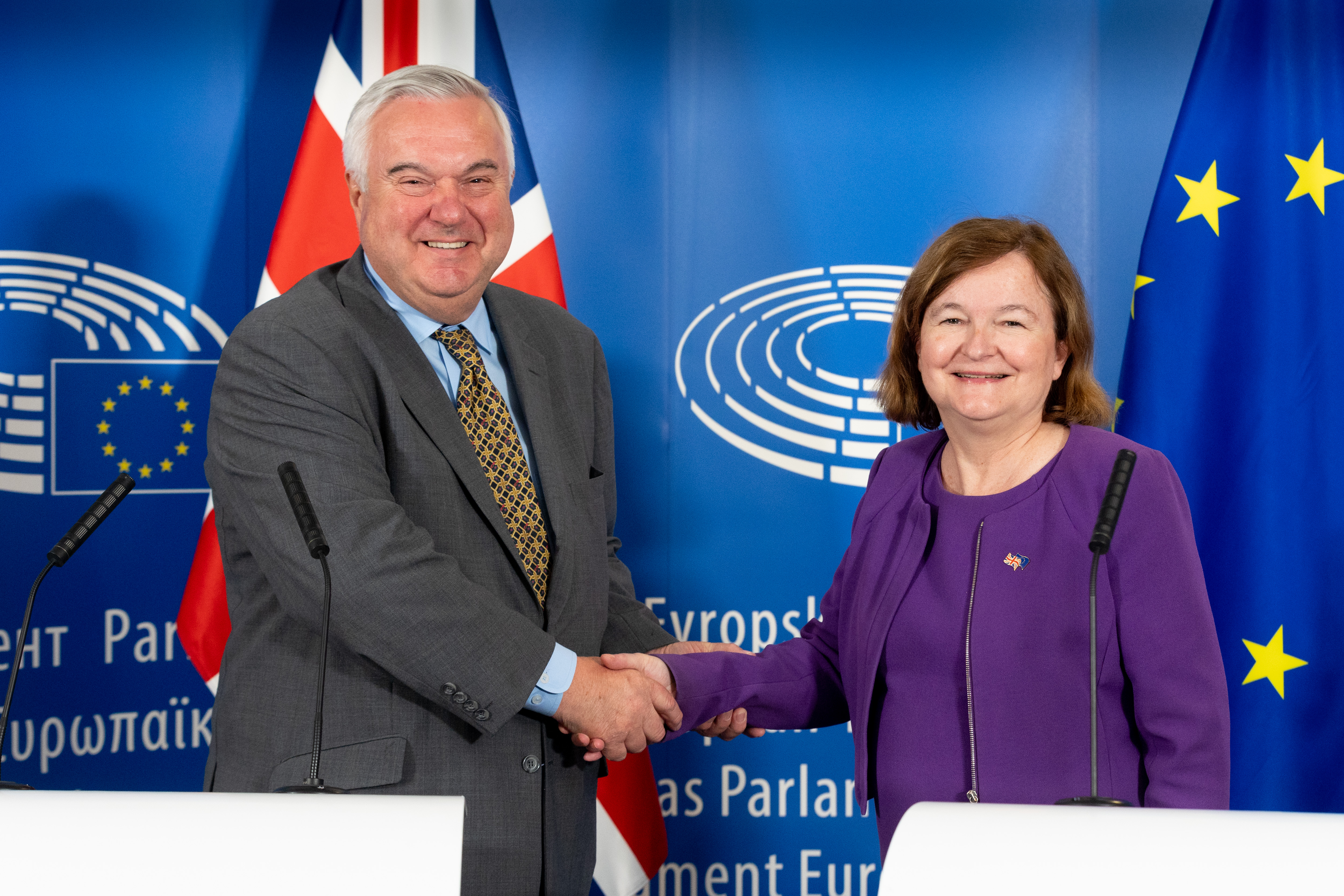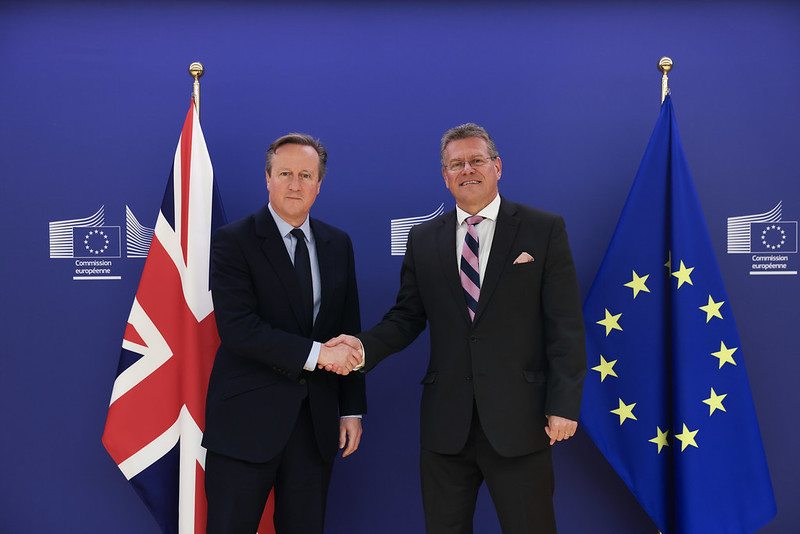Brexit & Beyond newsletter
4 December 2023

Welcome to the 4 December 2023 Brexit & Beyond newsletter
The fourth meeting of the EU-UK Parliamentary Partnership Assembly (PPA) takes place this week in London. The British-Irish Intergovernmental Conference (BIIGC) met on 28 November in Dublin, and discussed the Common Travel Area, Horizon Europe, and UK post-Brexit border controls, among other matters. A Senedd committee has published a report on EU-UK governance.
- EU-UK Parliamentary Partnership Assembly
- British-Irish Intergovernmental Conference (BIIGC)
- Senedd report on EU-UK governance
- Other news
EU-UK Parliamentary Partnership Assembly
The EU-UK Parliamentary Partnership Assembly (PPA) is meeting today and tomorrow (4-5 December) in Westminster. The PPA is able to make recommendations to the Partnership Council, which oversees the Trade and Cooperation Agreement. Parliamentarians will discuss mobility of people, data protection, fisheries, citizens' rights, artificial intelligence, and climate change, including the Carbon Border Adjustment Mechanism. DUP MLA Diane Dodds and Alliance MLA Kate Nicholl will attend from the NI Assembly. DUP MP Sir Jeffrey Donaldson is a full member of the PPA, while Baroness Ritchie is a substitute. The meeting is being streamed on the UK Parliament YouTube channel.

Co-chairs of the EU-UK Parliamentary Partnership Assembly Sir Oliver Heald and Nathalie Loiseau at the last PPA meeting in July 2023 | Source: EP © European Union 2023
The Commons Library has published briefings on visiting, working, and living in the EU after Brexit, citizens’ rights, and fisheries. The FT reports that EU member states are “keen” for a deal on youth mobility, and that the European Commission has started to “scope out” an EU-wide UK mobility deal. However, Peter Foster writes, it has found “a nervous partner in London that has warned that the UK political climate on immigration makes any such deal very tricky.”
British-Irish Intergovernmental Conference (BIIGC)
The British-Irish Intergovernmental Conference (BIIGC) met on 28 November in Dublin. The BIIGC aims to promote bilateral co-operation on matters of mutual interest between the British and Irish Governments.
Electronic Travel Authorisation (ETA) scheme
The Conference discussed the importance of the Common Travel Area (CTA), the UK Government’s Electronic Travel Authorisation (ETA) scheme, and its potential implications for the all-Ireland tourism sector. In a change to the initial plan, people who are legally resident in Ireland, and who do not need a visa, will not need an ETA when entering the UK from Ireland. However, the ETA scheme still applies to overseas tourists entering NI from the Republic of Ireland. The Northern Ireland Tourism Alliance (NITA) says over 70% of visits to NI arrive via Dublin and that the plan risks 25% of all tourism spend in NI. The British-Irish Parliamentary Assembly Sovereign Affairs Committee has published a report on ‘Protecting the Common Travel Area in the post-Brexit era.’ It considers the ETA scheme to be “unworkable” on the island of Ireland and “at odds with long-standing CTA arrangements and principles that underpinned the Belfast/Good Friday Agreement”.
Horizon Europe
The BIIGC agreed that British and Irish Horizon Europe National Contact points “should be encouraged to work together closely to identify potential calls in the Work Programmes where our research and innovation communities are well-placed to coordinate or jointly participate in a project application.” Horizon Europe is the EU’s research and innovation programme, which has a budget of €95.5 billion. The UK’s association to Horizon was delayed because of the NI Protocol dispute. The Specialised Committee (SC) on Participation in Union Programmes is meeting today, 4 December, and will formalise the UK’s participation in Horizon by adopting a decision. The minutes of the SC meeting of September 2022 have also been published. At this point, the UK’s access to Horizon wasn’t agreed. The UK “challenged the link that the EU had made between the Northern Ireland Protocol and the UK’s association to EU Programmes. The UK set out that in its view there was no legal base to make a link between the two issues, which are contained in two separate Agreements.”
Border controls
The UK and Irish Governments “recognised the importance of bilateral trade for both countries and agreed to work together to ensure a smooth trading relationship over the coming months including through the introduction of the UK’s new Border Target Operating Model/import controls.” The UK Government’s Border Target Operating Model sets out its approach to post-Brexit border controls on imports to GB, including the introduction of new checks on goods from Ireland, and plans to phase in controls on ‘non-qualifying’ goods from the island of Ireland.
Senedd report on EU-UK governance
The Senedd Legislation, Justice and Constitution Committee has published a report from its inquiry into UK-EU governance. It sets out whether and how Welsh interests are represented in the EU-UK relationship. The Committee concludes that the substantial decision-making powers granted to the UK and EU executives by the UK-EU agreements “necessitates the development of effective systems of parliamentary oversight”. It notes that decisions taken by governance bodies “could limit the ability of devolved institutions to exercise their legislative competence.” [Read more on our website on the governance of the Withdrawal Agreement, and governance of the Trade and Cooperation Agreement] The Committee highlights there is “a compelling case to be made for the further inclusion of sub-state and other regional voices, such as devolved institutions and EU Local and Regional Authorities voices in governance structures, particularly because responsibility for the implementation of key parts of UK-EU agreements falls to them”. It finds “it is incumbent on parliaments and legislatures in the UK to themselves improve oversight of these structures and to better work together to improve transparency and hold governments to account. UK parliamentary committees working on these issues should seek to work more closely together both through direct engagement and through the Interparliamentary Forum”. The committee intends to engage with its sister committees to consider how this could be achieved.
According to the report, transparency of discussions and decisions taken within UK-EU governance structures “is poor and should be improved”. Regarding the engagement of civil society, the report reflects that “important lessons can and should be learned from the experience of Northern Ireland where bottom-up solutions have resolved difficult issues between the EU and the UK”.
Other news
- The UK Foreign Secretary David Cameron met European Commission Vice-President Maroš Šefčovič in Brussels on 29 November. Lord Cameron tweeted that he looks forward to “working together on the issues that matter to us both, including support for Ukraine, the Withdrawal Agreement and maximising the opportunities of the Trade and Cooperation Agreement”. Lord Cameron will give evidence to the Lords European Affairs Committee on 14 December.

UK Foreign Secretary David Cameron with European Commission Vice-President Maroš Šefčovič | Source: Simon Dawson / No 10 Downing Street
- The Commons Library has published a briefing on the nearly 600 EU laws which will expire in the UK at the end of 2023 under the Retained EU Law (REUL) Act. The ‘saving’ power in the REUL Act expired at the end of October and was used once. The Northern Ireland Civil Service requested three pieces of REUL to be preserved for Northern Ireland only “because their revocation represents a policy change which would require agreement by Ministers in the Northern Ireland Executive which cannot be granted in the ongoing absence of that Executive”. The Government has published a list of statutory instruments which will be laid under the REUL Act.
- The Commons Environment, Food and Rural Affairs Committee is conducting an inquiry into UK trade policy, particularly as it relates to food and agriculture. On 21 November, Balwinder Dhoot, Director of Sustainability and Growth at the Food and Drink Federation, commented on the labelling requirements in the Windsor Framework, noting that additionally the UK Government “are unilaterally mandating” ‘not for EU’ labelling on products made in GB, regardless of whether they are going to NI. He said this means “if you are exporting to Ireland and that is your business model, you either have to have a separate product, which is very expensive, or stop sending goods to Ireland. The implementation costs of that run into hundreds of millions of pounds a year.” He called it “an unnecessary domestic policy. You cannot have a trade policy that is trying to promote exports on one hand, and then undermine that with domestic policy on the other.”
- The Lords Sub-Committee on the Windsor Framework has asked the Government for an explanation of the public procurement implications of Brexit for manufacturers in Northern Ireland. This issue was raised by Stephen Kelly, Chief Executive of Manufacturing NI, who recently told the committee, “Our manufacturers cannot directly participate in public procurement in the EU. They may manufacture goods—say, construction materials—but they cannot directly bid as an entity to an authority in Ireland, Germany or elsewhere as part of that public procurement”.
- Irish Grass Fed Beef has been granted Protected Geographical Indication (PGI) status. The EU’s PGI “emphasises the relationship between the specific geographic region and the name of the product, where a particular quality, reputation or other characteristic is essentially attributable to its geographical origin.” The UK Government intervened in the process to request that Northern Ireland be included in the geographical area; this was subsequently agreed.
- The Northern Ireland Human Rights Commission has published a legal analysis of immigration or related rights and equality protections in Northern Ireland after Brexit. It has also published research on Article 2 of the Windsor Framework and the rights of refugees and persons seeking asylum. Under Article 2 of the Windsor Framework, the UK Government committed to ensuring that there would be “no diminution of rights, safeguards or equality of opportunity” (as set out in the Good Friday Agreement) as a result of Brexit.
- The Department for Business and Trade has announced the appointment of seven new members to the Office for the Internal Market (OIM) Panel. The OIM supports the effective operation of the UK Internal Market.



